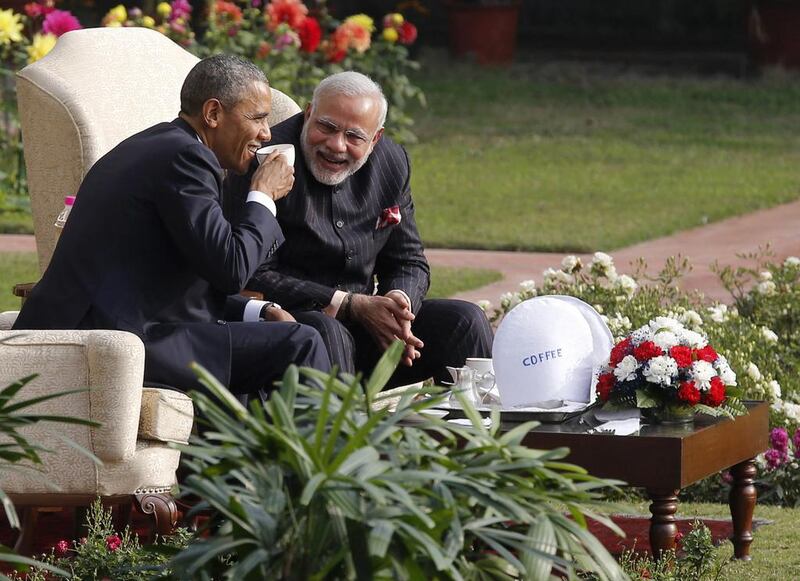NEW DELHI // Hours after president Barack Obama landed in New Delhi, India and the United States announced a breakthrough in a civilian nuclear energy agreement that has been deadlocked for seven years.
“The civil nuclear deal was the centrepiece of our relationship,” said prime minister Narendra Modi when the two leaders addressed the press on Sunday. “We worked with a sense of purpose for four months after I visited the US in September last year to make sure the deal is taken forward.”
Mr Obama landed on Sunday morning, in a capital that has gone into lockdown, with unprecedented levels of security to protect the US leader and his delegation.
More than 50,000 Indian security personnel swarmed the city, closing off roads and protecting the venues that Mr Obama visited.
Five hundred Secret Service agents and 20 Belgian Malinois sniffer dogs were flown in from the United States.
All roads that the presidential convoy travelled on throughout the day were closed down, starting at the Delhi airport where Air Force One touched down.
In a break with protocol, Mr Modi personally welcomed the US president and his wife, Michelle, upon their arrival.
The two leaders hugged warmly for the cameras before the Obamas left in the armoured presidential limousine.
The US delegation first went to Rashtrapati Bhavan, the Indian president’s official residence, where Mr Obama was received by a ceremonial honour guard and a 21-gun salute. Next, at Raj Ghat, the national memorial to Mahatma Gandhi, Mr Obama laid a wreath in remembrance to the Indian leader who is a source of inspiration around the world.
“What Dr Martin Luther King Jr said then remains true today – the spirit of Gandhi is very much alive in India today,” Mr Obama wrote in the visitor book. “And it remains a great gift to the world. May we always live in his spirit of love and peace – among all people and nations.”
Mr Obama proceeded to Hyderabad House, an imposing government building traditionally used for banquets with visiting dignitaries. He and Mr Modi discussed a host of bilateral affairs over a working lunch. “Earlier we were close, now we are together,” Mr Modi said during a tea break.
Late in the afternoon, Indian media outlets reported that the two countries had ironed out key sticking points over the nuclear deal, for which a framework deal was initially reached in 2008.
The US had, according to these reports, agreed to withdraw a clause that would enable it to track all nuclear fuel and technology that entered India, even if it did so from other countries. India has asked that the International Atomic Energy Agency do the monitoring instead.
In return, India promised to soften its liability law, which holds nuclear technology companies legally and financially accountable for any nuclear accidents.
Although this law cannot be changed, India is considering the offer of an insurance pool, which could cover technology suppliers’ financial liabilities in the event that such accidents happen.
“If there’s an insurance pool, for example, then the cost will have to be borne by the Indian taxpayer, which is likely to be unpopular,” said Sushant Singh, an analyst with the Takshashila Institution, a Bengaluru-based think tank. “An extra payment will be added to the contract payment, and the four public sector insurance companies will have to shoulder the financial burden.”
During a joint press conference, the US president and Mr Modi did not reveal details of what led to progress in talks.
Mr Obama merely said that the countries had made a breakthrough on two issues that were holding up the agreement.
“Nothing concrete has been announced,” Mr Singh said. “If these two hurdles are removed, then American companies can begin to bid for projects. The proper processes can begin to get under way.”
The two leaders also spoke about the establishment of hotlines between the national security advisers of India and the US, and about Washington’ support for a reformed United Nations Security Council that included India as a permanent member.
The US has also been trying to push India towards a commitment to reduced carbon emissions.
In response to that, Mr Modi said that although India, a sovereign country, couldn’t be pressured into international norms, “we feel pressure about what kind of planet we give to our children. We must be conscious about climate change and give future generations a cleaner and greener future.”ssubramanian@thenational.ae





